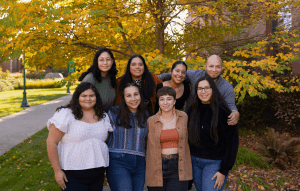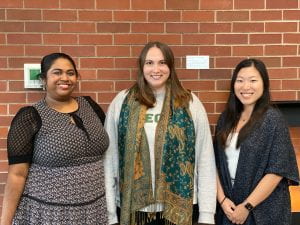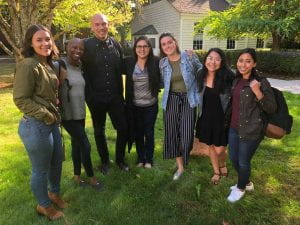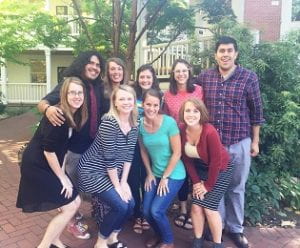|
2022 Cohort |
|
|
We call many places “home”: We have traveled to: We speak: |
Our research interests are: Immigrant and refugee mental health, immigration litigation effects on mental health, acculturation throughout the lifespan (especially in mixed-status families), historical and contemporary traumas within the Salvadoran community and Central American diaspora, Latinx mental health and cultural components that serve as both risk and protective factor (i.e. Familismo), disordered eating prevention and intervention among traditionally underserved communities and weight stigma prevention, the intersection between alcohol and other substance use and sexual risk taking and victimization, especially with low-income adolescents and young adults, Queer / Gender and Sexual Minority (GSM) experience; eating disorders, weight stigma, and body image concerns, particularly in relation to gender identity; mental illness identity formation in media, mental illness/health in children, teenagers, and families, treatments for addressing trauma and treatment equity for holistic practices to treatment, essentially, how so we treat the WHOLE person and advocate for change in the systems around them, gang prevention programs for youth and adults, as well as prevention programs for first-generation, undocumented students, and students of color Our hobbies are: What drew us to the program: |
|
2021 Cohort |
|
|
We call many places “home”: We speak: |
Our research interests are: Cultural factors associated with child development; mental health outcomes of Asian American youth & families, intimate partner violence, help-seeking behaviors, mental health stigma, eating behaviors, disordered eating, weight stigma, health behaviors Our hobbies are: What drew us to the program: We have traveled to: |
| 2020 Cohort | |
|
We call many places “home”: We speak: |
Our research interests are: Substance use treatment and prevention services, intimate partner violence, trauma recovery, post-incarceral re-entry, meditation, therapeutic efficacy, culturally adapted interventions/ therapeutic approaches Our hobbies are: What drew us to the program: We have traveled to: |
| 2019 Cohort | |
|
We call many places “home”: We speak: |
Our research interests are: Adolescent sexual risk behaviors and protective factors, racial stress and related interventions, college students wellbeing with an intersectional focus, substance use interventions and recovery, promoting successful reentry, resiliency factors and mental health of LGBTQIA+ populations in Latin America, child and family relationships, unique Chinese family dynamics, suicide prevention, the application of psychological research in criminal justice policy Our hobbies are: What drew us to the program: We have traveled to: |
|
2018 Cohort |
|
|
We call many places “home”: We have traveled to: We speak: |
Our research interests are: Suicide prevention, social supports for people with suicidal behavior, etiology of depression, intimate partner violence, support for mixed raced young adults, social justice oriented counseling techniques, health equity, body image of black and brown women, Latina/o educational persistence, trauma healing among Latina/os and immigrants, mental health correlates of discrimination and bias among the Latino/a community, Latino/a first-generation experiences, addictive behaviors, mind-body approaches to substance use prevention and intervention, Parent-child dynamics, Family-based interventions, young adult behaviors and its impact on mental health and substance use, mindfulness, health disparities, LGBTQ+ identity-related concerns Our hobbies are: What drew us to the program: |
2015 Cohort:
We call many places “home”: El Paso and Austin TX, Washington DC, Sacramento CA, Searcy Arkansas, Florence Italy, Coeur d’Alene ID, Costa Rica, Panama, the Bay Area CA, Denver Colorado, Portland OR, Decatur GA, Utah, Eugene OR, Spokane and Brewster WA.
We have travelled to: Canada, Uganda, Kenya, India, Nepal, Cambodia, Vietnam, Laos, Thailand, Switzerland, France, Ukraine, Hungary, Panama, Germany, Spain, Italy, Belgium, Portugal, Netherlands, Israel, Indonesia, Mexico, Malta, Czech Republic, Slovakia, Austria, Poland, England, Ireland, Wales, Ecuador, Belize, Nicaragua, Sweden, and Chile.
We speak: English, Spanish, French, and Italian.
Our research interests are: Effects of early family interactions on neurophysiological development, family systems theory, violence prevention, better serving Native populations, community engagement, early parent-child interactions, gender socialization and how these processes influence goal setting/career development in adolescents/emerging adults, trauma and trauma prevention in teen girls, resiliency, Latino mental health and stress in underserved populations, minority men and higher education, immigrant psychology, Latino psychology, multiculturalism, social justice, Dreamers and the Dreamer experience in the United States from adolescence through adulthood with a special interest on identity formation and social dynamics, child maltreatment, incorporating clinical interventions for children who have suffered trauma into school and community systems, and career assessment and intervention in Spanish speaking populations.
Our hobbies are: Yoga, hiking, arts & crafts, biking, trail running, playing with dogs and cats, guitar, piano, chess, basketball, tennis, cycling, films/documentaries, football, Poetry/ Slamming, Activism, Sports fanatic, fantasy football, high impact sports competitor (Rugby, MMA, Judo and wrestling), working out, coaching, Dancing, reading, excessive coffee drinking, backpacking, snowshoeing, and traveling.
What drew us to the program: focus on community interventions, emphasis on social justice and diversity, dual focus on clinical practice and research, collaborative efforts in research and practice, offering a versatile degree, offering a Spanish language specialization, and working with an encouraging community of scholars all drew us to the program here at UO.
2014 Cohort:
We are from Indiana, Colorado, Wisconsin, California, Vermont, and Arizona.
We have traveled to Ecuador, Mexico, the Dominican Republic, Panama, Spain, Ireland, the Netherlands, Scotland, Greece, Italy, Turkey, the Czech Republic, France, China, Thailand, Canada, Patagonia, the Bahamas, Israel, Samoa, and 43 US states.
We speak English, Spanish, and Mandarin Chinese.
Our professional interests include immigrant identities, prevention and intervention for youth and families, vocational work with under-served populations and athletes, interventions for at-risk adolescents, suicide prevention, and the implementation of mental health services in the school setting.
Our hobbies are camping, hiking, yoga, reading, writing, rapping, traveling, fishing, sports, biking, crossword puzzles, running, comics, video games, skiing, and music.
We were drawn to this program because of its emphasis on working within the community to create change, different practicum experience, collaborative and rigorous program, and to have the opportunity to work with such esteemed and warm faculty.
2013 Cohort:
We are from New York, Moldova, California, Texas, Indiana, Pennsylvania, and Minnesota.
We have traveled to Latin America, Europe, South East Asia, Ghana, Canada, Israel, England, Mexico, China, Morocco, and Peru.
We speak English, Russian, Spanish, Polish, and Hebrew.
Our professional interests include working with children and families, college student development, career decision making, college student mental health, academic and career experiences of African American and Latino males, family counseling, community mental health, working with trauma survivors, positive parenting, teaching, working with adolescents at risk, and working with children and teens in foster care.
Our hobbies are biking, traveling, playing with kids and animals, cooking, baking, dancing, playing drums, live music, laughing and making others laugh, spoken word poetry, spending time with friends and family, traveling, reading, hiking, woodwork, crafting, basketball, running, photography, and drinking coffee.
We were drawn to this program because of the collaborative and friendly atmosphere, the balance of research and practical/clinical training, its focus on multiculturalism and social justice, the supportive faculty, its good match rates, its consistent student funding, its commitment to the scientist-practitioner model, and the welcoming community of students.
2012 Cohort:
We are from California, Washington, New Mexico, Thailand, Texas, North Carolina, Minnesota, and Washington DC.
We have traveled to Thailand, Cambodia, Ecuador, Jamaica, England, Germany, Switzerland, Italy, Ireland, Austria, Holland, Greece, Czech Republic, Belgium, Mexico, Canada, Australia, Sweden, Denmark, Vietnam, Laos, Cambodia, New Zealand, France, Guatemala, Jamaica, Costa Rica, and Uruguay.
We speak English, Thai, and Spanish.
Our professional interests include veterans and minority mental/physical health, multiethnic identity, young adult career development, feminist multicultural approach to clinical work and supervision, clinical work related to trauma, eating disorders, anxiety, and identity exploration, community mental health, Latino higher education, teaching, ACT/mindfulness, researching cumulative risk and development, parenting interventions with immigrant families, exploring contextual supports and barriers, and Latino adolescents’ career development.
Our hobbies are football, cooking, eating, watching TV, rock climbing, backpacking, cats, running, camping, pets, running, dancing, yoga, zumba, hiking, traveling, reading fiction novels, swimming, camping, tennis, and glass art making.
We were drawn to this program because of the esteemed faculty, its emphasis on creating a collaborative student community, its focus on multiculturalism and diversity, its various clinical training, its various research opportunities, its consistent funding opportunities, and its emphasis on social justice.
2011 Cohort:
We are from California, New York, and Massachusetts.
We have traveled to the Dominican Republic, Costa Rica, Greece, England, Morocco, and Indonesia.
We speak English, ASL, and Spanish.
Our professional interests include researching and working with trauma, sexual violence, college student mental health and development, eating disorders, sports psychology, intimate partner violence, gender role norms, and mindfulness.
Our hobbies are having fun, drinking coffee, judo, running, brewing beer, football, hiking, pets, and photography.
We were drawn to this program because of its friendly student community, the quality of the program, its focus on person/environment interactions and the ecological model, and the esteemed faculty.












